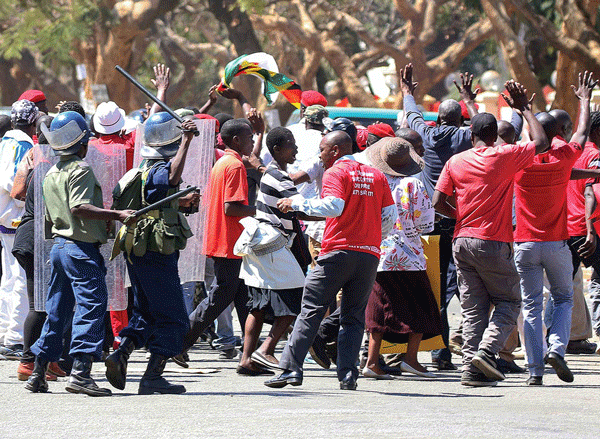
BY BLESSING GORONGA
In 2017, Zimbabwe was thrown into euphoria, as long-time dictator Robert Mugabe was overthrown and replaced by Emmerson Mnangagwa, the former vice-president, who promised reform and a new dispensation.
Barely four years after those jubilant scenes that marked Mugabe’s fall, Zimbabwe is turning into a very dangerous place reminiscent of the dark days during the Unilateral Declaration of Independence by the Rhodesian Front in 1965 and the Gukurahundi era in the first few years of independence.
Firstly, Mnangagwa seems hell-bent on foisting a one-party state in Zimbabwe; a very archaic way of governing and an anathema to the democratisation process that is sweeping across Africa and the world.
In pursuit of this one party state agenda, Mnangagwa’s has a two-pronged approach which involves the incapacitation of the opposition and the co-option of willing activists, a model akin to China, where those allowed to “oppose” are literally chosen by the Chinese Communist Party.
I will start with the more dangerous aspect of Mnangagwa’s plan — the destruction of the opposition.
The past year has seen the jailing of activists who are vocal in opposing Mnangagwa, the most prominent being Joannah Mamombe — an opposition legislator and a Chevening scholar.
Prior to her jailing, Mamombe and a couple of colleagues were allegedly kidnapped by people believed to be linked to the state.
- Chamisa under fire over US$120K donation
- Mavhunga puts DeMbare into Chibuku quarterfinals
- Pension funds bet on Cabora Bassa oilfields
- Councils defy govt fire tender directive
Keep Reading
Following noise and campaigns from activists, foreign embassies including that of the United Kingdom, Mamombe was freed from captivity, but that was only the beginning of her ordeals.
Since then she has been arrested several times and as I write, she is held without bail together with Cecilia Chimbiri, with whom she was allegedly kidnapped together.
Another activist, Netsai Marova has faced similar persecution and the government has indicated that she may soon be arrested.
Just as with Mamombe and Chimbiri, she is likely to be denied bail.
Makomborero Haruzivishe, a member of MDC Alliance youth executive, is also behind bars without bail, while Allan Moyo, a university student leader, spent more than two and a half months in prison after being denied bail.
Takudzwa Ngadziore, another student leader has also spent several days in prison after being denied bail in very curious circumstances.
In terms of freedom of expression, which Mnangagwa promised to guarantee and which is guaranteed in the constitution, the current president may be as bad as or even worse than his predecessor.
Hopewell Chin’ono, a freelance journalist, has been arrested at least three times, while Mduduzi Mathuthu, the editor of ZimLive, has been forced into hiding.
Their only crime is that they exposed corruption in government circles and drew links between Mnangagwa’s family and graft in the procurement of Covid-19 equipment.
In the most egregious attack on freedom of the media, suspected state agents abducted and tortured Mathuthu’s nephew, Tawanda Muchehiwa, whom they held captive for three days.
His badly bruised body was showcased on Sky News in the United Kingdom and around the world.
As has become the norm, the government denied any involvement in the abduction, but as fate would have it, the whole thing was captured on CCTV.
The authorities have had no response since then.
I bring these examples because I want to show that criticising or standing up to Mnangagwa and his government is now a very dangerous vocation, with activists being thrown into jail at a whim.
In a normal situation, activists and the media are supposed to be a watchdog of the government, but not in Zimbabwe, where watching over the government could land anyone in jail.
Mnangagwa’s second strategy is the co-option of the opposition, with those who resist his overtures facing his wrath.
Nelson Chamisa, the leader of the MDC Alliance, the second biggest party in Zimbabwe at least by terms of votes in the last election, has had his organisation literally taken away from him.
Legislators from his party have been thrown out of parliament in the strangest circumstances, while his party headquarters have been taken away from him.
In total disregard of the voters’ choices, Chamisa’s legislators have been replaced with pliable opposition leaders who are not really opposed to Mnangagwa, but rather are agreeable to him.
Instead of having by-elections to fill in the vacant parliamentary seats, the government has banned the holding of elections in the most shameless attack on the country’s democracy and the constitution.
This is simply because the governing Zanu PF party is averse to opposition and criticism and literally wants to go it alone.
Zimbabwe is slipping into a very dark abyss, where all pretence of democratic governance shall be dispensed with, meaning it will increasingly become difficult for the opposition and activists to remain in the country.
Exile, no matter how uncomfortable, is increasingly becoming the best options for thousands of people whose only crime is that they dared to stand up and fight for freedom of association and freedom of expression.
The trouble with the Zimbabwean government is that they are polishing their propaganda and public relations act, where they portray themselves as victims rather than perpetrators of gross human rights abuses.
However, they cannot fool everyone all the time and the human rights abuses are increasingly coming to the fore.
If nothing is done to halt the excesses of the Zimbabwean government, the country will soon slide into an autocracy never before imagined, where the opposition is outlawed and all activists are behind bars.
- Blessing Goronga is a Zimbabwean activist. He can be contacted on [email protected]










